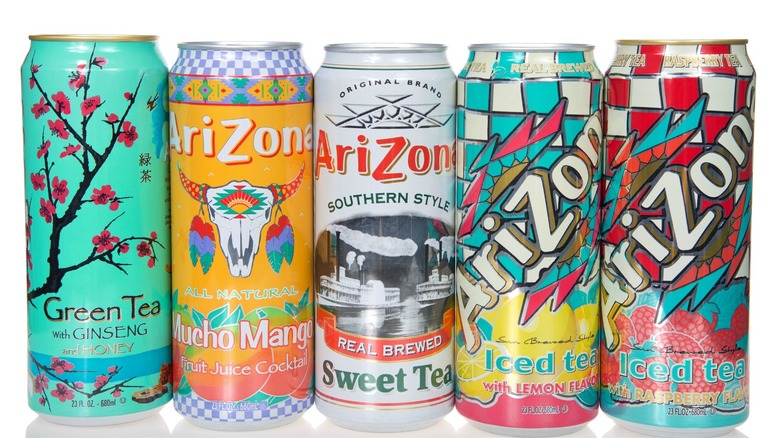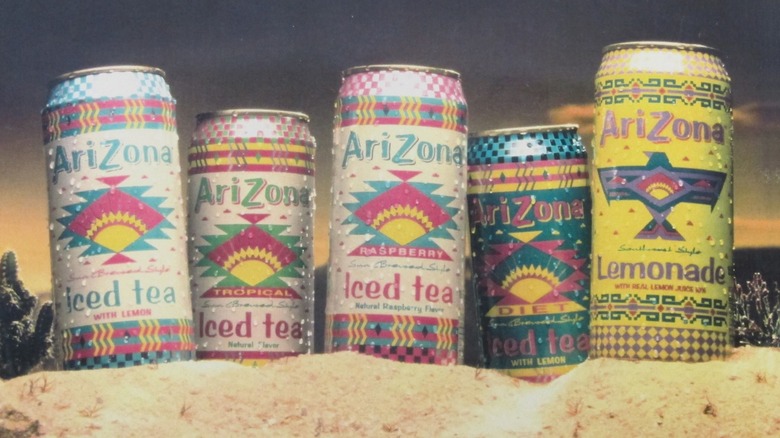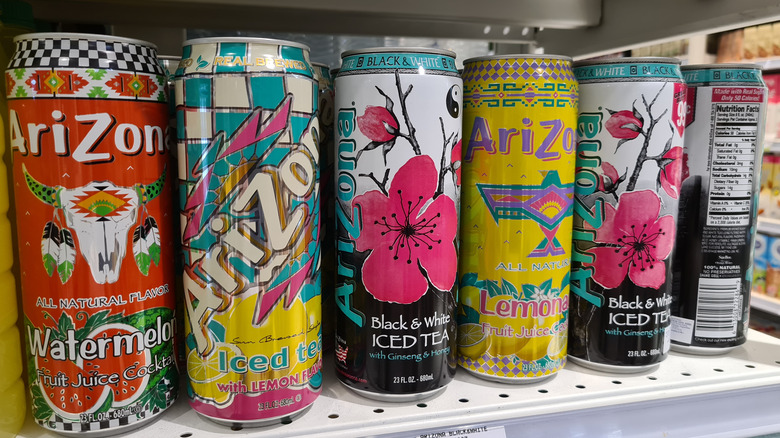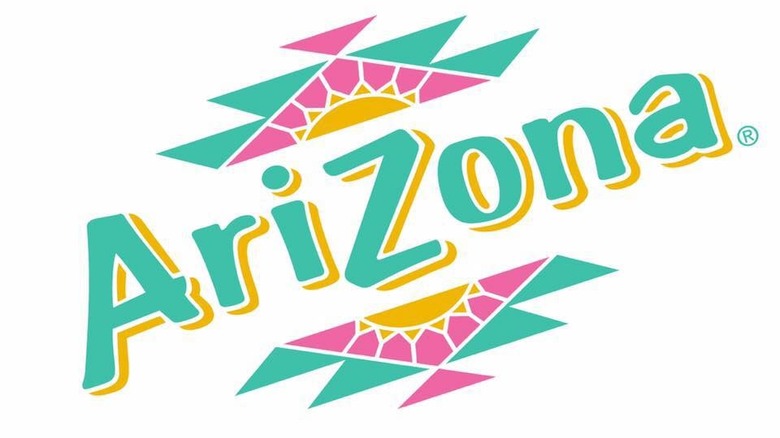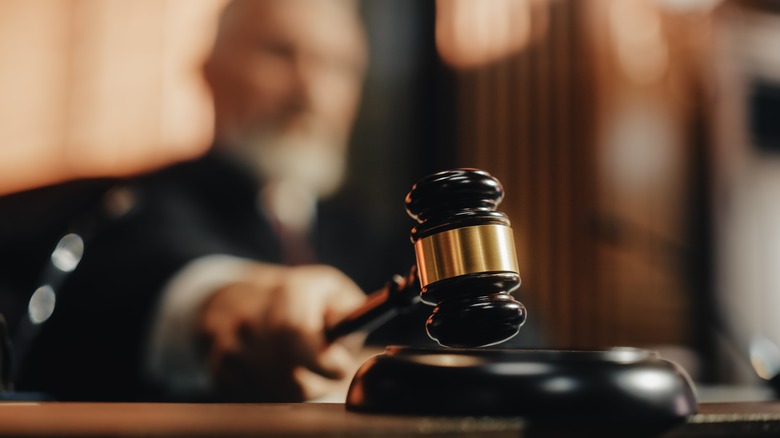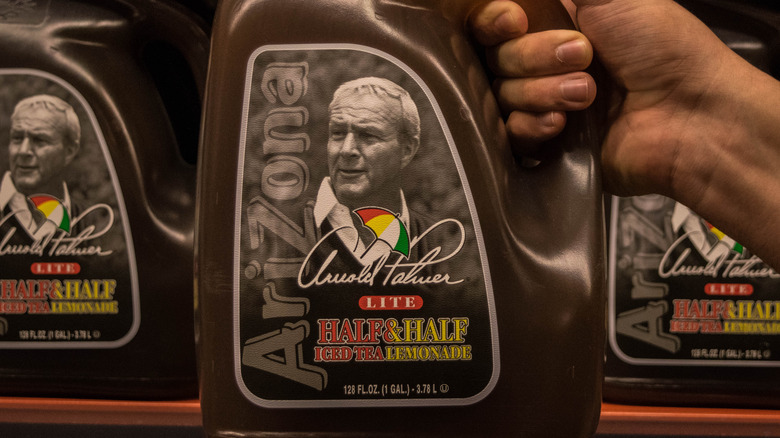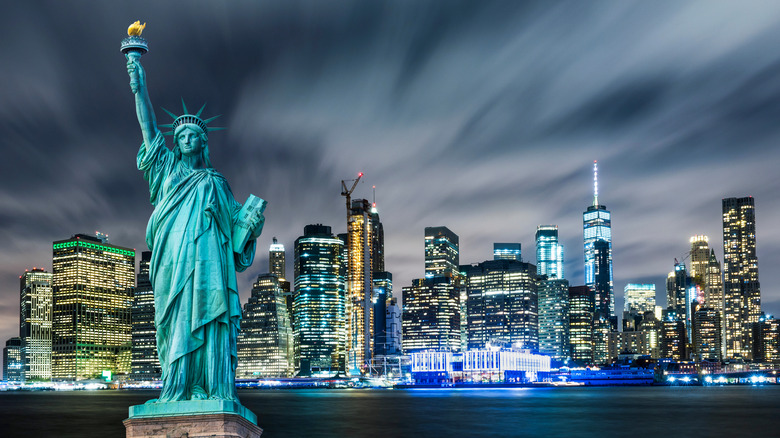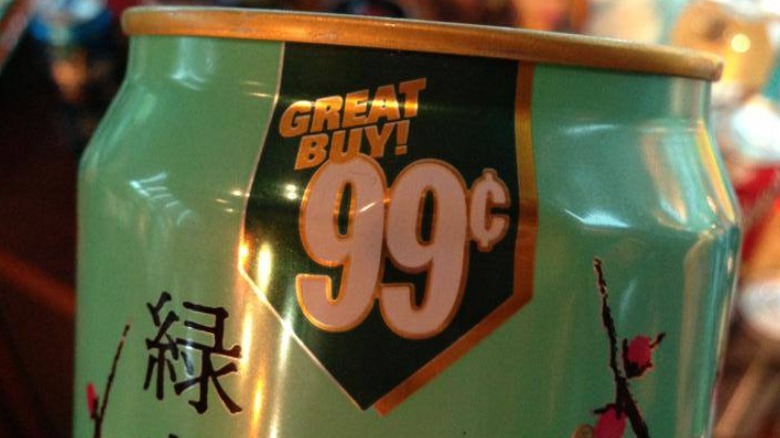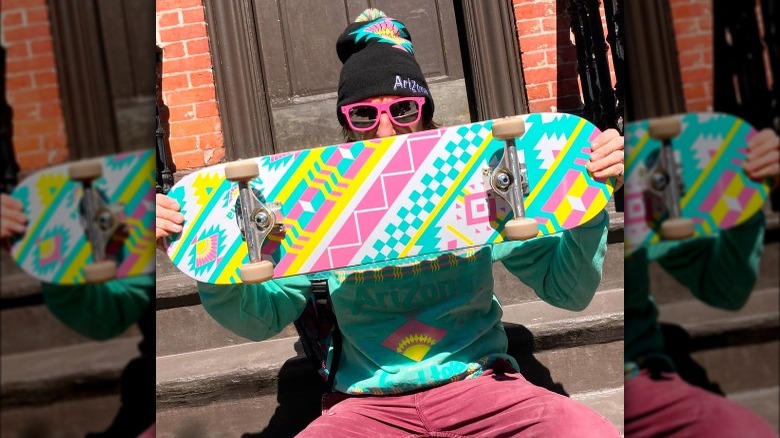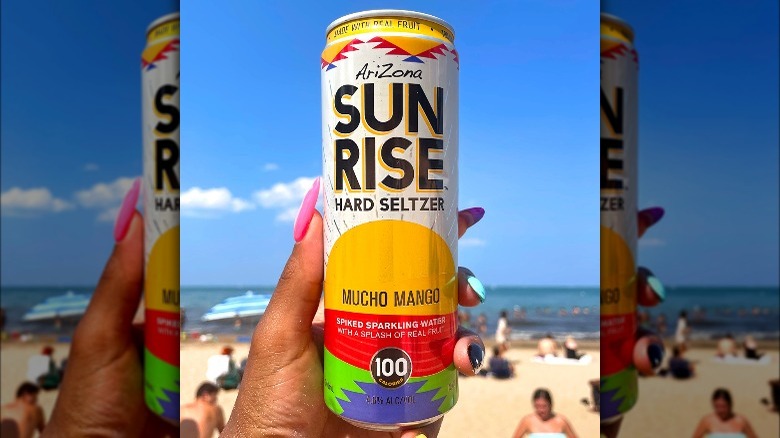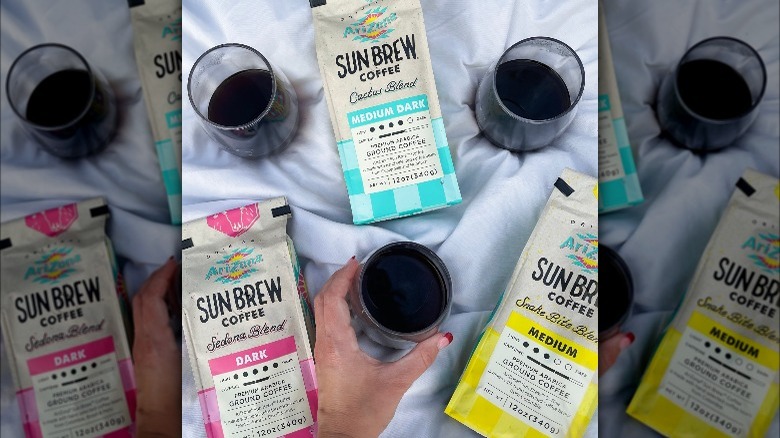The Untold Truth Of AriZona Beverages
The tale of AriZona Beverages is one of the great American success stories of the last half-century. In just three short decades, the company, founded by two scrappy New York City kids, has gone from nothing to selling more than 3 billion containers of beverages a year, according to Forbes. "They're one of the few beverage companies that started from scratch and became a billion-dollar company in the last 20 years," Michael Bellas, chairman of consulting and research firm Beverage Marketing Corp. told the outlet.
It hasn't all been smooth sailing for the beverage maker, of course. Not too long ago, AriZona Beverages nearly went out of business thanks to years-long infighting between the aforementioned business partners. To put it mildly, it's been an eventful 30 years for the New York-based company, full of ups and downs and plenty of little-known stories. From the origins of its famous 23-ounce cans and iconic design aesthetic, to its unique connection to the skateboarding world and how on earth it's still able to sell its drinks for just 99 cents, here is the untold truth of AriZona Beverages.
AriZona Beverages was founded by two beer distributors
On a cold, bleak February day back in 1991, a young beer distributor from Brooklyn, New York named Don Vultaggio was making a delivery to a Manhattan bodega when he spotted a Snapple truck pull up outside to make a delivery of its own. "Iced tea in the wintertime?" he recalled thinking to himself (via Forbes). "I'm going into the tea business."
Vultaggio pitched the idea to his business partner John Ferolito. The two had worked together as beer distributors since the 1970s. Selling beer in some of New York City's most crime-laden neighborhoods, Vultaggio estimates they were robbed 100 times. "It was like the Wild, Wild West in those days," Vultaggio's wife Ilene said. "Every night the alarms would go off." In 1985, the pair transitioned into brewing beer themselves. Their first two malt liquor beverages, named Midnight Dragon and Crazy Horse, were popular at convenience stores but were not without controversy. A poster advertising Midnight Dragon feature a scantily clad woman, drawing the ire of women's groups. The same was true with Native Americans, who found the Crazy Horse name and packaging offensive.
Between the robberies and controversies, a new line of work was more than appealing to the two young entrepreneurs. Ferolito was sold and AriZona Beverages was on its way.
AriZona teas were an immediate hit thanks to their Big Cans
AriZona Beverages founders Don Vultaggio and John Ferolito knew from the start that they wanted to compete with Snapple, they just didn't how. According to Forbes, this issue came to a head during a trip to a manufacturing plant where they gauged the pricing of a potential iced tea bottle. "On the way home I'm saying to myself, 'Why would customers buy me? They're comfortable with Snapple,'" Vultaggio recalled thinking. "By the time we got off the parkway ... we had talked ourselves out of the tea business."
The business idea laid dormant for another two months until the pair made a fateful trip to the store, where they spotted a 24-ounce Gatorade can. Vultaggio recognized that type of can from his beer distributing days. "When I was a truck driver in the early 70s I delivered Schlitz malt liquor in a big can," he recounted during a Reddit Ask Me Anything session. "They were one of the few beer companies to use the big can to market their product."
Believing it would give them a leg up, the now-ubiquitous AriZona "Big Can" was born right then and there. "I said, 'That's the product!'" Vultaggio recounted. "Sell it at the same price as Snapple, 24 ounces versus 16." The first AriZona teas hit shelves in May 1992 and were an instant hit. The company would go on to sell 18 million cases of drinks in its first three years.
AriZona Beverages' famous logo and packaging designed by the company founder's wife
AriZona's iconic logo, with its Southwestern design and bright pastels, wasn't the creation of some fancy marketing agency. It was created by none other than company founder Don Vultaggio's wife.
Vultaggio knew his new product needed distinctive packaging that would attract a customer's eye when perusing the crowded iced tea shelves. He enlisted the help of his wife Ilene, who didn't need to look far for inspiration. According to Thrillist, the couple's Queens, New York house was aquamarine and decorated with a full-blown Southwestern aesthetic. "Our mom designed the first cans," Spencer Vultaggio, the couple's son and AriZona's chief marketing officer, told Eater. "We had this water cooler in our kitchen with this southwest zigzag motif in the pink, yellow, teal that would become the lemon tea can, which was the first entry into the market in 1992."
The bold design choice did the job of separating AriZona Iced Tea from its competitors. "Pastels had never really been used at that point," Don Vultaggio told Forbes. "It was attractive — but, more importantly, different." Ilene's artistic skills were put to use a second time to create the packaging for the company's next product, green iced tea. This time, she took inspiration from a bottle of her perfume bottles and one of her son Spencer's coloring books. The resulting design of a cherry blossom on a teal background still covers AriZona Green Tea cans to this day.
The company's future was in serious doubt due to a long-running legal feud between the founders
No one would ever want to imagine a world without AriZona iced tea, but unbeknownst to many, that nightmare almost became a reality.
In 1998, company founders Don Vultaggio and John Ferolito entered an agreement in which the former would operate the company, allowing the latter to move out of state (via Reuters). Under terms of the deal, selling company stock to outsiders was forbidden. A decade later, however, Ferolito had a change of heart and wanted to sell AriZona Beverages. Worried that a sale would affect his 1,000 employees and confident in an operation bringing in annual sales of $1 billion, Vultaggio resisted. Eventually, the two went to court. After several rulings against him, Ferolito sought to dissolve AriZona Beverages completely. New York State law, however, gave Vultaggio the right to buy out his co-owner, which he did.
That did not mark the end of the dispute as the two former partners disagreed on the value of the company. According to Inc., Ferolito believed AriZona Beverages was worth between $3 billion and $4 billion. Vultaggio said the number was roughly $500 million. In April 2015, the two sides agreed to an undisclosed settlement just before the case went to trial. At the time, Reuters reported that the legal dispute marked the largest corporate dissolution case in New York State history.
AriZona Beverages helped bring Arnold Palmer Iced Tea to the masses
Legendary golfer Arnold Palmer first came up with his now-iconic, eponymous drink way back in 1960. Over the next several decades, the half-iced tea, half-lemonade mixture became an increasingly popular drink. Yet Palmer himself had never profited from it. That changed in 2001 when, according to Golf Week, a group of business partners pitched him the idea of selling his own line of Arnold Palmer drinks. The only problem? The group needed a manufacturing partner. Enter AriZona Beverages. The two sides struck a deal and Arnold Palmers began hitting shelves in 2002.
Despite Palmer's name recognition and AriZona's incredible success in the beverage industry, the drink was not an immediate hit. "Over the first few years, I say, most companies our size would have given up on it," AriZona chairman Don Vultaggio told ABC News. "Because, you know, if the numbers don't reach what I'll call a 'meaningful number' after six months, most large companies will say, 'Eh, it's not worth it.'"
In what would prove to be an incredibly wise decision, AriZona didn't give up on the drink and things eventually turned around. By 2010, sales of Arnold Palmer Iced Tea reached $100 million. That total doubled just two years later. "There was gold there," Vultaggio said at the time, "but it was deep down." Today, AriZona Beverages is selling the equivalent of 1 million cans of Arnold Palmers every day.
AriZona Beverages had to remind the public that it's based in New York to prevent a boycott
AriZona Beverages was founded in New York—and in New York it has stayed. The company's headquarters are on Long Island, in the town of Woodbury. But it seems much of the general public still believe the beverage maker is based in the Southwest. While this would usually be a harmless misunderstanding, it turned out to be a major problem a few years back.
In 2010, the state of Arizona passed a controversial immigration bill that caused many people to boycott businesses based within the state. According to the Daily News, comedian George Lopez went on Twitter and quipped, "went to buy a AriZona Iced Tea – they asked me for my documentation."
AriZona quickly became a trending topic. The company replied to Lopez, "We're BIG fans! Just wanted to let you know that AriZona is and always has been a NY company." Sensing they might need to do some damage control, AriZona took to its own website to clear things up. "We have become aware of misinformation being circulated about AriZona Beverages and we would like to make sure statements about our company are correct," the company wrote, according to Gothamist. "As many of you know, AriZona Beverages proudly traces its origins back to New York ... For the last 16 years our headquarters have remained on Long Island where we continue to sell and distribute AriZona Iced Teas and beverages."
AriZona Beverages has been sued several times for misleading consumers
Behemoth companies and their deep packets are often the target of lawsuits, and AriZona Beverages is no exception. In particular, the beverage maker has been sued several times by consumers alleging AriZona drinks weren't what they claimed to be.
In 2010, a class-action lawsuit was brought against AriZona Beverages regarding the advertising of the brand's iced tea drinks (via Truth in Advertising). The plaintiffs alleged the drink contained non-natural ingredients despite being labeled "all natural." A federal judge wasn't persuaded. They dismissed the case after concluding there was neither any evidence of artificial ingredients nor would the public be confused about the labeling. Several years later, two consumers took aim at AriZona's Green Tea (via Delish). They claimed the drink didn't contain any ginseng, despite the words "with ginseng" appearing on the can. In 2021, a federal judge ruled the lawsuit could proceed, Bloomberg Law reported.
As of this writing, the most recent AriZona beverage to come under fire is Arnold Palmer Half & Half Iced Tea & Lemonade Lite. According to a class-action lawsuit filed in February 2022, the word "lite" in the drink's name misleads consumers into believing the product contains less sugar and fewer calories (via Top Class Actions). "Far from being 'Lite' and low in sugar, sugar is the second most predominant ingredient in the product by weight," the suit states. It goes on to claim the misnomer enabled AriZona to sell more Arnold Palmer and at a higher price point.
AriZona is determined to keep its 23-ounce cans at 99 cents
Unless you've been living in a state of denial, you're well aware that just about everything is significantly more expensive than it was a year ago. Yet if you peruse the aisles of your local convenience store, you'll see that the 23-ounce cans of AriZona Iced Teas are still just 99 cents — the same price as when they first hit the shelves in 1992. The Los Angeles Times investigated this phenomenon and discovered why and how AriZona is still selling its drinks at such a low price.
AriZona Beverages isn't immune to the skyrocketing inflation rates. Many of the items needed to make and deliver their products have gone up in cost, including aluminum, high fructose corn syrup, and gasoline. Instead of passing that extra expense onto its customers, however, AriZona has found ways to reduce their cost of business. For example, the company recently started making its cans with narrower necks to use less aluminum. This is on top of its previous cost-savings measures, such as running its delivery trucks at night to improve efficiency and spending very little on marketing. "Your company has to deal with cost increases, but your customers have to deal with cost increases too," AriZona chairman Don Vultaggio told the Los Angeles Times.
Even better news — AriZona is determined to keep the low price going forward. "I'm committed to that 99-cent price," Vultaggio said. "When things go against you, you tighten your belt."
AriZona Beverages is a fixture in the skateboarding world
Take one look at an AriZona Iced Tea can and you can tell it's made by a company that embraces the counterculture — the bright colors, the capital "Z" styling, and, of course, the 99-cent label printed right on the aluminum that appears more out of place in this ever-expensive world. Who could embrace that lifestyle more than skateboarders? "AriZona has always been the beverage of choice [for skateboarders]," professional skateboarder Josh Zickert told Thrillist. "You looked and felt cool at the parks drinking it. And as a youngster, you got an AriZona, went to the spot, skateboarded, and had fun with your friends." The price has also been a major selling point for young skateboarders. "As a little kid, I only had $2 or $3 bucks in my pocket," skateboarder Cody Madsen told the outlet. "Being able to load up on a tall a** drink with money left over to buy snacks, which lasted me all day at the skatepark, had me feeling rich."
After gaining an audience in the skateboarding community early on, AriZona has fully embraced it in recent years. In 2007, Zickert befriended Spencer Vultaggio, son of AriZona founder Don Vultaggio. The beverage company agreed to sponsor Zickert's skateboarding team on a 12-day competition tour. Since then, AriZona has sponsored just about every type of skateboarding event around, from competitions to summer camps. Today, the company even has its own skateboarding team and sells skateboards on its website.
AriZona Beverages teamed up with Heinken to make a line of hard seltzers
In case you haven't noticed, hard seltzer has completely taken over the alcoholic beverage market in recent years. According to Food Dive, nearly every major beer producer has their own version of the drink. Few non-alcoholic beverage companies, however, have made the leap. But AriZona is not your average beverage maker.
In 2020, the company announced that it too was throwing its hat into the hard seltzer ring. Needing a little help with the boozy part of drink concocting, AriZona teamed up with Heineken to produce Sun Rise Hard Seltzer. "As both family-owned companies and brand building powerhouses, there are many synergies between Heineken and AriZona, making this a winning partnership to bring our unique seltzer proposition to the market," AriZona Beverages chairman Don Vultaggio said in a statement.
If you're thinking this is just another hard seltzer line, think again. According to the companies, this unique pairing enabled the two beverage giants to produce a drink unlike anything already on the jam-packed shelves. "Most of the current hard seltzers on the market are clear, with similar flavor profiles," Heineken chief marketing officer Jonnie Cahill said. "So we jointly saw an opportunity to add a splash of fruit to the category as we know consumers are looking for real ingredients and great taste."
The seltzer comes in four flavors: Mucho Mango, Cherry Punch, Lemon and Grapefruit. Each contains 100 calories per can with a 4.6 percent ABV.
AriZona Beverages recently entered the coffee market
AriZona Beverages has conquered the iced tea market like few other companies, so why not try its hand in another uber-popular beverage segment? In 2021, the company unveiled Sun Brew, a new line of ground coffee products (via Food Dive). "We tried a couple hundred varieties of coffee and educated ourselves in the market," chief marketing officer Spencer Vultaggio told Forbes. The result is a high-quality product line of three different blends made from beans sourced from Central and South America. "Our coffees are actually very high end, country specific for the different blends," he added.
AriZona hopes to distinguish itself in the overcrowded coffee market by coming in at a lower price point than other brands. "We are setting ourselves apart in quality as well as affordability," Vultaggio said. "We actually fill our K-Cups at a higher fill of coffee ground than our competitors. Hot water only comes in contact with the coffee for a short amount of time with K-Cups, so we add more grounds to the K-Cup, and you get a stronger, more classic representation of a brewed cup of coffee. We have the quality of a La Colombe at price point of the Dunkin'." Sun Brew coffee is sold in 2.5- and 12-ounce bags and 12-count K-Cup packs. It's available at select grocery stores, as well as online through AriZona's website and Amazon.
